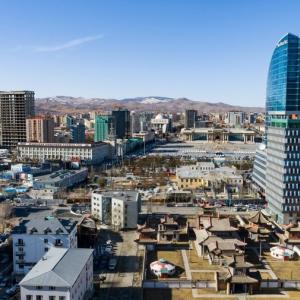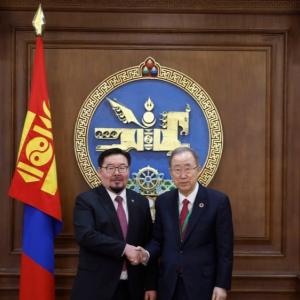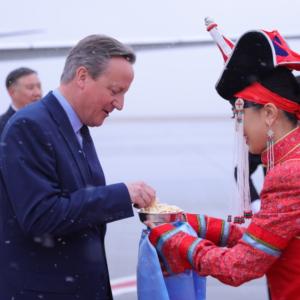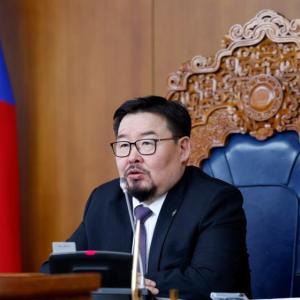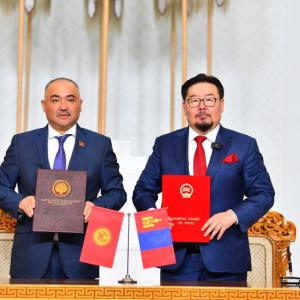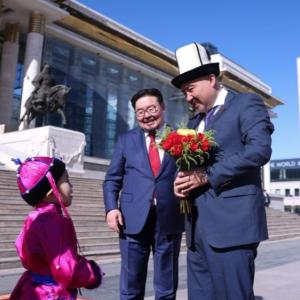President Khurelsukh: Mongolia has decided to annually spend up to 1 percent of GDP to combat climate change and desertification
Politics
Ulaanbaatar, June 14, 2023 /MONTSAME/. President of Mongolia Khurelsukh Ukhnaa delivered
the opening remarks at the “Green Finance - International Forum".
We present the full transcript of the President’s speech:
“Distinguished guests,
Ladies and gentlemen,
Good day to you all!
We have gathered here today to discuss the
ways to reduce the negative effects of climate change, which has become the
most difficult challenge humanity faces, and to deliberate on ways to increase
our efforts to battle climate change and to find solutions to finance planned
projects and programs.
Climate change has a strong impact on the security of human existence with
scientists, researchers, world leaders and international communities paying
special attention to this issue. Although, every country is trying to fulfill
its goals, obligations and commitments, the negative effects of climate change
are continuing to intensify.
Numerous studies consistently demonstrate that since pre-industrial levels for
over the last 170 years, the average global temperature has risen by 1.09
percent as well as other negative impacts including loss of global
biodiversity.
Moreover, from heatwaves in Europe and wildfires in North America, to
droughts in Africa and floods in Asia: last year saw climate disasters on all
five continents.
In meantime, world economy shows a rocky recovery.
According to the IMF, global growth is projected to decelerate from 3.4
percent in 2022 to 2.8 percent in 2023. In particular, the slowdown in the Euro
Area is even more pronounced.
Despite the recent drop in energy prices, energy security concerns will
continue to loom large. This speaks to the importance of the green transition
and green development.
Therefore, despite the world facing the many social, economic and
geopolitical challenges and difficulties, we must intensify our efforts to
protect the environment and reduce the negative effects of climate change.
In other words, we need higher ambition, stronger policies, and more
finance for implementation.
Therefore, the last point we will focus during this forum.
Despite the fact that the world is making efforts to reduce the negative
effects of climate change, many issues remain to be resolved in terms of how to
finance these efforts and policies.
Increasing climate finance is critical to not only mitigating the negative
impacts of climate change, but also to increasing resilience and fostering
sustainable and inclusive global development trends.
As of today, we are seeing only around 630 billion dollars a year in
climate finance across the whole world according to the IMF report.
However, in order to fully reach the goals under the Paris Agreement and
the sustainable development goals of the United Nations, trillions of funds are needed every year.
For instance, the latest study by the London School of Economics shows that
developing countries (other than China)’ annual investment in climate action
needs to increase immediately, from about $500 billion in 2019 to $2.4 trillion
by 2030.
Financing should go toward accelerating the energy transformation, increasing
investments in resilience to protect lives and livelihoods protecting people's
livelihoods against the increasingly devastating effects of climate change, enhancing
biodiversity and conserve the ecosystems, and building capacity of countries to
effectively combat climate change.
Thus, countries cannot singlehandedly overcome the
challenges that the humanity
faces.
To deliver on our shared climate goals, we must
combine policy reforms, capacity development, and financing arrangements. What
we need today is unprecedented cooperation and coordination.
Distinguished
guests,
Mongolia, which has an extreme continental climate, is one of the countries
most affected by climate change. Specifically, over the last 80 years, its temperatures
have risen by 2.25 percent, which is twice the world average.
In Mongolia, 77 percent or 120 million hectares of the Mongolian territory
is affected by desertification.
In addition, the number of annual natural disasters has more than doubled
over the last 25 years, and weather-related disasters affect 8 percent of
Mongolians every year and cost 0.6 percent of GDP annually in damages, in
average.
The countries of the world have determined their share in reducing
greenhouse gas emissions, and in this context, more than 70 countries have
pledged to reduce their greenhouse gas emissions to zero by 2050.
Although Mongolia’s GHG emissions
are small in absolute terms (0.1 percent of global GHG emissions), Mongolia has
consistently supported the international community's efforts to mitigate and
adapt to climate change and has been making its due contribution.
For example, Mongolia set a goal of reducing greenhouse gas emissions by
27.2 percent by 2030, and at the 27th Conference of the Parties to the United
Nations Framework Convention on Climate Change expressed its policy and
objective to zero greenhouse gas emissions by 2050.
In order to meet the above policies and objectives, Mongolia is
implementing them in the domestic policies and action plans of the key social
and economic sectors such as agriculture, energy, infrastructure, and health.
In this context, the President of Mongolia initiated national movements
such as "One Billion Trees", "Food Supply and Security",
and "Healthy Mongolians" and these are being implemented implemented
throughout the country. I am pleased to inform you that the Government, private
sector, wealth creators, domestic and foreign investors, and citizens are
actively participating and working together towards our common goal.
For example, by planting and caring for billions of trees by 2030, within
the framework of the "One Billion Trees" national movement, we are
confident that it will play a crucial role in the development of sustainable
financing while reducing deforestation and degradation, increasing water
resources and greenhouse gas sequestration.
In point of fact, I am pleased to note that UN Secretary General Antonio
Guterres, during his visit last year, expressed his willingness to join and
cooperate with the "One Billion Trees" national movement.
With the implementation of the movement, the most important initial result
is that there is a big change in the attitude of the citizens and the public
towards the protection and restoration of the environment.
Furthermore, Mongolia needs to drastically reduce carbon dioxide emissions
from the agriculture and energy sectors.
Mongolia’s potential for renewable energy is very large estimated at 2,600
gigawatts thanks to its geographical location and climatic condition. It presents
an opportunity to decarbonize its energy sector and further contributes to the
energy supply of the region.
Therefore, Mongolia will pay special attention to increasing its clean and
renewable energy sources, improve the business environment in the sector, and
actively cooperate with investors and the international community.
In addition, we are working to develop the food and agriculture sector in
line with green development. For example, the projects, programs and activities
implemented within the national movement "Food Supply and Security"
will be aimed at supporting green development.
Distinguished delegates,
As Mongolians, our cultural heritage stems from our nomadic lifestyle,
which has fostered a deep connection and harmonious coexistence with nature.
This unique way of life embodies our inherent responsibility to both preserve
the pristine beauty of our surroundings and derive sustainable benefits from
it, ensuring its longevity for future generations.
Therefore, economic and social policies should be fully focused on rapid reduction
of environmental pollution and ecological degradation, improving people's
livelihoods, and building green development.
For countries, there is a limited opportunity to solve and overcome the
risks, challenges of climate change as
well as necessary funding by themselves, therefore it is vital to cooperate in
a mutually beneficial way at the regional and international level, exchange
experience and further expand the cooperation and collaboration of the
organizations in this field.
In particular, due to the global pandemic, high inflation, and the energy
crisis, limited fiscal space in most countries in recent years poses a
significant risk to increase green finance.
Therefore, the second "“GREEN FINANCE – INTERNATIONAL FORUM” is
important for expanding regional and international cooperation, strengthening
mutual understanding, increasing green financing, improving the system,
exchanging best practices, and coordinating policies and measures.
Furthermore, series of important issues will be discussed during this
conference, such as strengthening institutional capacity for green development,
enhancing coordination, roles and responsibilities of economic sectors,
international approaches, standards and new instruments for green and sustainable
financing, advanced technology, innovation and green agricultural sector,
energy effective construction industry.
It is pre-estimated that $11.5 billion is needed for Mongolia to reach successfully
targets in its Nationally determined contribution.
In terms of our efforts for mobilizing this funding, Mongolia has decided
to annually spend up to 1 percent of our GDP to combat climate change and
desertification.
Moreover, I am pleased to mention that in recent years, our private sector has
been actively working to mobilize sustainable funding with tangible outcome.
For instance, during last year's "Green Finance - Regional
Forum", Mongolia adopted its
sustainable finance roadmap, and the financial sector committed to rapidly
increase its green loans by 2030.
Moreover, Mongolia has developed its sustainable finance taxonomy in
accordance with the international standards, and currently working to create a
specialized financial institution for green financing through a proper public
and private sector partnership model.
Also, I am pleased to mention that Mongolian commercial banks have
successfully issued the first green bond on the international market, as well
as Financial Regulatory Committee has granted a permission to issue the first
domestic green bond by one of banks yesterday.
In the future, it is essential for Mongolia to fully define comprehensive
green development policy, improve legal environment, ensure coordination and
cooperation of stakeholders, and create a green business environment.
It is also advisable to actively participate in the carbon market,
determine the carbon tax and green financing environment, introduce optimal
innovative financing methods, and work
proactively to create the legal framework.
For the implementation of the above policy objectives, we will actively
cooperate with the public and private sector, foreign and domestic investors as
well as international organizations towards increasing sustainable
financing through their support and involvement.
Distinguished guests, delegates,
Fresh air, clean water, and sacred soil are the main
sources of the wellbeing of the mankind.
The green development is the foundation of sustainable
global development.
For the sake of the green development, humanity and the
world we shall look in the same
direction, cooperate harmoniously, and promptly make effective yet bold
decisions.
Let’s work together towards the safer life for the
humanity!
I wish the best for the organization of the forum!”

 Ulaanbaatar
Ulaanbaatar






























